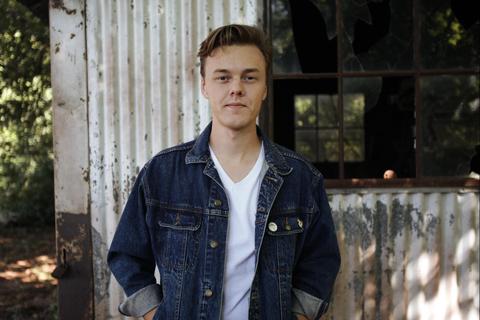Parker Millsap
An Oklahoma native brought up in the Pentecostal church, which he’s since departed, 20-year-old Parker Millsap will make you a true believer with his self-titled Okrahoma Records/ Thirty Tigers debut album. Accompanied by his collaborators, high school buddy Michael Rose on bass and fiddle-player Daniel Foulks, the young tunesmith delivers his religious-laced parables, character-driven narratives and relationship tales with the fire-and-brimstone fervor of a preacher, restoring our faith in the power of song.
Influenced by the dust-bowl neutrality of John Steinbeck, Millsap’s memorable creations include the wife-murdering bible-thumper of “Old Time Religion,” the self-made church-on-wheels minister in “Truck Stop Gospel,” the questioning believer of “When I Leave,” the meth cooks in “Quite Contrary” and the gambler who spends all his money buying lottery tickets in “Yosemite.” Filled equally with ghosts and guilt, as well as an objectivity that invites listeners to paint themselves in each picture, Millsap’s songs teeter on the fine line between gospel and the blues, sin and redemption, God and the devil, heaven and hell… from the pulpit to the back pew.
In songs like the blues-driven “Quite Contrary” (with a Millsap harp solo right out of the Yardbirds) and “At the Bar (Emerald City Blues),” Parker ponders what might become of well-known nursery rhyme figures and Wizard of Oz characters, imagining Mary, Mary as a street hooker with Little Jack Horner as her pimp or the Tin Man, “looking to find a piece of yourself/That’s been left behind.”
“That comes from studying the violent origin of fables and bible stories, and wondering what happened to the characters afterward, when they grew older,” explains Parker about “Quite Contrary,” describing it as his tribute to bluesman like Howlin’ Wolf or even Tom Waits. Millsap grew up listening to church hymns, while his dad, an electrician and music fan, turned him on to story-telling folk and blues artists like Ry Cooder, Taj Mahal, Lyle Lovett and John Hiatt.
Both “Forgive Me,” which could also be read as a confessional, and the Dylanesque “The Villain,” are songs that ride the roller coaster of relationships, the latter about refusing to be the bad guy in your partner’s nightmares (“I don’t want to be the one that lets you down anymore”).
“Disappear” touches on the fantasy of uprooting, trying to “leave behind the things/that never stood a chance” and start a brand-new life, while “When I Leave” tells the story of someone who has abandoned the church but still harbors doubts about it, Parker’s own message to his family, which still worries about his salvation.
“I’m not trying to criticize the church,” explains Millsap about his still-strong attraction towards the music he first heard there. “I already have a guilty conscience, which only gets magnified when you are brought up in that sort of environment, and it can do weird things to you. My songs show what happens to people when things go wrong within that belief system, and they are unable to handle it.”
Like the God-fearing killer in “Old Time Religion,” who’s “got an old-time conviction/keeps the bodies in the shed,” and strangles his wife with a banjo string. Or the traveling evangelist in “Truck Stop Gospel,” who insists, “Just want to modify your behavior/I just want you to love my savior,” then proceeds to cast a demon out of a parking lot prostitute by having her join his “angel choir.”
“It’s up to the listener to figure out where they sit,” says Millsap of his song’s characters. “Whether they’re questioning faith, or very devout, will certainly color their judgment. Some people think I’m being cynical about religion, while others praise me for showing the love of God. Then there are those who appreciate my objectivity in leaving the decision to them. Most of my favorite pieces of art don’t try to attach any moral.”
Musically, the album ranges from the New Orleans street wake feel of the muted, distorted trumpets which close “Old Time Religion” to the electrified Chicago blues of “Quite Contrary,” from the gospel contrition of “Forgive Me” to the slide-guitar country-rock of “Land of the Red Man,” Millsap’s tribute to his home of Oklahoma, where he grew up in tiny Purcell, “as normal a childhood as you could think of, a Norman Rockwell painting.” That is, if you don’t count the “speaking in tongues” at church.
“To me, that wasn’t unusual,” Parker declares. “Every Sunday, you witnessed God speaking through people. It sounds pretty intense, but you got used to it.”
Parker first picked up a guitar at nine, then plugged in and went electric after getting into Eric Clapton and Stevie Ray Vaughan, eventually starting a cover band, Fever in Blue, with classmate Michael Rose, which would play Jimi Hendrix songs at the local Loose Caboose Festival in downtown Purcell on Labor Day weekend. After graduating high school, he went to Northern California, where he interned at Prairie Sun Recording, the studio where Tom Waits cut Bone Machine and Mule Variations. Returning to Oklahoma, he “put down the electric guitar and got into song craft,” releasing an indie album, Palisade, which he sold “from the back of my van.” A trip to Nashville found him playing at the Tin Pan South songwriter's festival, where an “in the round” performance impressed Old Crow Medicine Show's manager so much that he invited Millsap to open a string of dates for the band, later leading to a slot on their
prestigious New Year's Eve gig at the Ryman Auditorium.
Millsap also opened dates for fellow Oklahoma blues-rocker John Fullbright earlier this year.
“Hope I’m not burning my luck up early,” laughs the humble Millsap about the good things starting to happen for him.
Like the state where he was born and still lives, Parker Millsap is a tough soul, at home with extremes of temperature… and temperament.
“I do have a great deal of pride in where I come from, and that’s not like me,” he admits, explaining Oklahoma is Choctaw for “Red Man.” “The people are some of the nicest, most hospitable you’ll ever meet. I think that’s because, when they originally settled here, it was wilderness, and the only thing they had to hang on to was one another.”
Parker Millsap is ready to share those Oklahoma roots with the rest of the country, and, hopefully, the world.
“I like to set goals for myself that are impossible to reach,” he explains. “That way, I always have something to aim for, a better song, different characters, new stories.. I just want to pay the bills and feed my dog, and maybe buy a new guitar every now and then. That’s all I need. I don’t want to be Elvis Presley, but I wouldn’t complain if a million girls screamed for me, either. Just don’t tell my girlfriend that.”
















